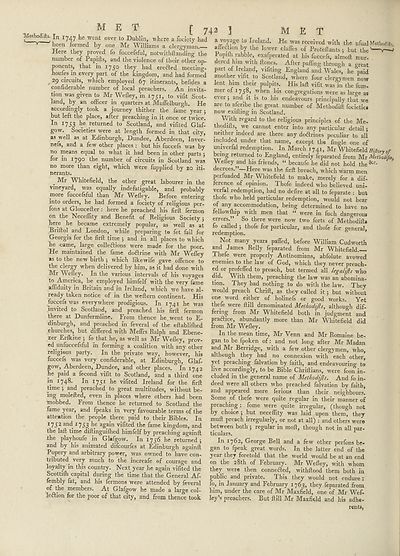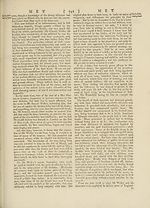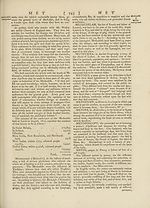Encyclopaedia Britannica, or, a Dictionary of arts, sciences, and miscellaneous literature : enlarged and improved. Illustrated with nearly six hundred engravings > Volume 13, MAT-MIC
(788) Page 742
Download files
Complete book:
Individual page:
Thumbnail gallery: Grid view | List view

M E T [ 742 3
;Jelll°'Ui: 1tn I747 l'e went over to Dublin, where a fociety had a voyage to Ireland.
been formed by one Mr Williams a clergyman.
Here they proved fo fuccefsful, notwithftanding the
number of Papifts, and the violence of their other op¬
ponents, that in 1750 they had eroded meeting-
houfes in every part of the kingdom, and had formed
29 circuits, which employed 67 itinerants, befides a
confiderable number of local preachers. An invita¬
tion was given to Mr Wefley, in 1751, to vifit Scot¬
land, by an officer in quarters at Muffelburgh. He
accordingly took a journey thither the fame year 5
but left the place, after preaching in it once or twice.
In 1753 he returned to Scotland, and vifited Glaf-
gow. Societies were at length formed in that city,
as well as at Edinburgh, Dundee, Aberdeen, Inver-
nefs, and a few other places : but his fuccefs was by
no means equal to what it had been in other parts j
for in 1790 the number of circuits in Scotland was
no more than eight, which were fupplied by 20 iti¬
nerants.
. Mr Whitefield, the other great labourer in the
vineyard, was equally indefatigable, and probably
more fuccelsful than IVIr "Wclley. Eefore enterin°'
into orders, he had formed a fociety of religious per*
fons at Gloucefter : here he preached his firft fermon
on the Neceffity and Benefit of Religious Society j
here he became extremely popular, as well as at
Briftol and London, while preparing to fet fail for
Georgia for the firft time ; and in all places to which
he came, large collettions were made for the poor.
He maintained the fame doftrine with Mr Wefley
as to the new birth ; which likewife gave offence to
the clergy when delivered by him, as it had done with
Mr Wefley. In the various intervals of his voyages
to America, he employed himfelf with the very fame
affiduity in Britain and in Ireland, which vre have al¬
ready taken notice of in the w^eftern continent. His
fuccefs was everywhere prodigious. In 1741 he was
invited to Scotland, and preached his firft fermon
there at Dunfermline. From thence he went to E-
dinburgh, and preached in feveral of the eftabliflied
churches, but differed with Meffrs Ralph and Ebene-
zer Erlkine 5 fo that he, as wrell as Mx Wefley, prov¬
ed un fuccefsful in forming a coalition with any other
religious party. In the private way, however, his
fuccefs was very confiderable, at Edinburgh, Glaf-
gow, Aberdeen, Dundee, and other places. In 1742
he paid a fecond vifit to Scotland, and a third one
in 1748. In 1751 he vifited Ireland for the firft
time ; and preached, to great multitudes, without be¬
ing molefted, even in places where others had been
mobbed. From thence he returned to Scotland the
fame year, and fpeaks in very favourable terms of the
atte»tion the people there paid to their Bibles. In
1752 an<f a£ain vifited the fame kingdom, and
the laft time diftinguiftied himfelf by preaching againft
the playhoufe . in Glafgow. In 1756 he returned j
and by his animated difeourfes at Edinburgh againft
Popery and arbitrary power, was owned to have con¬
tributed very much to the increafe of courage and
loyalty in this country. Next year he again vifited the
Scottiffi capital during the time that the General Af-
fembly fat, and his fermons V'ere attended by feveral
of the members. At Glafgow he made a large col¬
lodion for the poor of that city, and from thence took
MET
„ A.~ , , He was received with the ufualMethod^
aftechon by the lower claffes of Proteflants ; but the' "v—j
Popilh rabble, exafperated at his fuccefs, almoft mur¬
dered him with ftones. After paffing through a great
part of Ireland, vifiting England and Wales, he paid
another vifit to Scotland, where four clergymen now
lent him their pulpits. His laft vifit was in the ham¬
mer of 1758, when his congregations were as large as
ever; and. it is to his endeavours principally that we
are to a.fcribe the great number of Methodift focieties
now exifting in Scotland.
With regard to the religious principles of the Me-
thodifts,. we cannot enter into any particular detail ;
neither indeed are there any dodrines peculiar to all
included under that name, except the Angle one of
un.iverfal redemption. In March 1741, Mr Whitefield Hifiory of
rcturne4 to England, entirely feparated from Mr Methodifia,
Wefley and his friends, “ becaufe he did not hold tbe5^-
decrees.”—Here was the firft breach, which warm men
perfuaded Mr Whitefield to make, merely for a dif¬
ference of opinion. Thofe indeed who believed uni-
verfal icdemption, had no defire at all to feparate : but
thofe who held particular redemption, would not hear
of any accommodation, being determined to have no
fellowfliip with men that “ were in fuch dangerous
errors.” So there were now two forts of Methodifts
fo called ; thofe for particular, and thofe for general,
redemption.
Not many years paffed, before William Cudworth
and James Relly feparated from Mr Whitefield.
Thefe were properly Antinomians, abfolute avowed
enemies to the law of God, which they never preach¬
ed or profeffed to preach, but termed all legalifis who
did. With them, preaching the law was an abomina¬
tion. They had nothing to do with the law. They
would preach Chrift, as . they called it 5 but without
one word either of holinefs or good works. Yet
thefe were ftill denominated Methodijls, although dif¬
fering from Mr Whitefield both in judgment and
praftice, abundantly more than Mr Whitefield did
from Mr Wefley.
In the mean time, Mr Venn and Mr Romaine be¬
gan to be Ipoken of: and not long after Mr Madan
and Mr Berridge, with a few other clergymen, who,
although they had no connexion with each other,
yet preaching falvation by faith, and endeavouring to
live accordingly, to be Bible Chriftians, were foon in¬
cluded in the general name of Methodijls. And fo in¬
deed were all others who preached falvation by faith,
and appeared more ferious than their neighbours.
Some of thefe were quite regular in their manner of
preaching: fome were quite irregular, (though not
by choice j but neceffity was laid upon them, they
muft preach irregularly, or not at all) : and others were
between both 5 regular in moft, though not in all par¬
ticulars.
In 1762, George Bell and a few other perfons be¬
gan to fpeak great words. In the latter end of the
year they foretold that the world would be at an end
on the 28th of February. Mr Wefley, with whom
they, ivere then connected, withftood them both in
public and private. This they would not endure :
fo, in January and February 1763, they feparated from
him, under the care of Mr Maxfield, one of Mr Wef-
ley’s preachers. But ftill Mr Maxfield and his adhe¬
rents.
;Jelll°'Ui: 1tn I747 l'e went over to Dublin, where a fociety had a voyage to Ireland.
been formed by one Mr Williams a clergyman.
Here they proved fo fuccefsful, notwithftanding the
number of Papifts, and the violence of their other op¬
ponents, that in 1750 they had eroded meeting-
houfes in every part of the kingdom, and had formed
29 circuits, which employed 67 itinerants, befides a
confiderable number of local preachers. An invita¬
tion was given to Mr Wefley, in 1751, to vifit Scot¬
land, by an officer in quarters at Muffelburgh. He
accordingly took a journey thither the fame year 5
but left the place, after preaching in it once or twice.
In 1753 he returned to Scotland, and vifited Glaf-
gow. Societies were at length formed in that city,
as well as at Edinburgh, Dundee, Aberdeen, Inver-
nefs, and a few other places : but his fuccefs was by
no means equal to what it had been in other parts j
for in 1790 the number of circuits in Scotland was
no more than eight, which were fupplied by 20 iti¬
nerants.
. Mr Whitefield, the other great labourer in the
vineyard, was equally indefatigable, and probably
more fuccelsful than IVIr "Wclley. Eefore enterin°'
into orders, he had formed a fociety of religious per*
fons at Gloucefter : here he preached his firft fermon
on the Neceffity and Benefit of Religious Society j
here he became extremely popular, as well as at
Briftol and London, while preparing to fet fail for
Georgia for the firft time ; and in all places to which
he came, large collettions were made for the poor.
He maintained the fame doftrine with Mr Wefley
as to the new birth ; which likewife gave offence to
the clergy when delivered by him, as it had done with
Mr Wefley. In the various intervals of his voyages
to America, he employed himfelf with the very fame
affiduity in Britain and in Ireland, which vre have al¬
ready taken notice of in the w^eftern continent. His
fuccefs was everywhere prodigious. In 1741 he was
invited to Scotland, and preached his firft fermon
there at Dunfermline. From thence he went to E-
dinburgh, and preached in feveral of the eftabliflied
churches, but differed with Meffrs Ralph and Ebene-
zer Erlkine 5 fo that he, as wrell as Mx Wefley, prov¬
ed un fuccefsful in forming a coalition with any other
religious party. In the private way, however, his
fuccefs was very confiderable, at Edinburgh, Glaf-
gow, Aberdeen, Dundee, and other places. In 1742
he paid a fecond vifit to Scotland, and a third one
in 1748. In 1751 he vifited Ireland for the firft
time ; and preached, to great multitudes, without be¬
ing molefted, even in places where others had been
mobbed. From thence he returned to Scotland the
fame year, and fpeaks in very favourable terms of the
atte»tion the people there paid to their Bibles. In
1752 an<f a£ain vifited the fame kingdom, and
the laft time diftinguiftied himfelf by preaching againft
the playhoufe . in Glafgow. In 1756 he returned j
and by his animated difeourfes at Edinburgh againft
Popery and arbitrary power, was owned to have con¬
tributed very much to the increafe of courage and
loyalty in this country. Next year he again vifited the
Scottiffi capital during the time that the General Af-
fembly fat, and his fermons V'ere attended by feveral
of the members. At Glafgow he made a large col¬
lodion for the poor of that city, and from thence took
MET
„ A.~ , , He was received with the ufualMethod^
aftechon by the lower claffes of Proteflants ; but the' "v—j
Popilh rabble, exafperated at his fuccefs, almoft mur¬
dered him with ftones. After paffing through a great
part of Ireland, vifiting England and Wales, he paid
another vifit to Scotland, where four clergymen now
lent him their pulpits. His laft vifit was in the ham¬
mer of 1758, when his congregations were as large as
ever; and. it is to his endeavours principally that we
are to a.fcribe the great number of Methodift focieties
now exifting in Scotland.
With regard to the religious principles of the Me-
thodifts,. we cannot enter into any particular detail ;
neither indeed are there any dodrines peculiar to all
included under that name, except the Angle one of
un.iverfal redemption. In March 1741, Mr Whitefield Hifiory of
rcturne4 to England, entirely feparated from Mr Methodifia,
Wefley and his friends, “ becaufe he did not hold tbe5^-
decrees.”—Here was the firft breach, which warm men
perfuaded Mr Whitefield to make, merely for a dif¬
ference of opinion. Thofe indeed who believed uni-
verfal icdemption, had no defire at all to feparate : but
thofe who held particular redemption, would not hear
of any accommodation, being determined to have no
fellowfliip with men that “ were in fuch dangerous
errors.” So there were now two forts of Methodifts
fo called ; thofe for particular, and thofe for general,
redemption.
Not many years paffed, before William Cudworth
and James Relly feparated from Mr Whitefield.
Thefe were properly Antinomians, abfolute avowed
enemies to the law of God, which they never preach¬
ed or profeffed to preach, but termed all legalifis who
did. With them, preaching the law was an abomina¬
tion. They had nothing to do with the law. They
would preach Chrift, as . they called it 5 but without
one word either of holinefs or good works. Yet
thefe were ftill denominated Methodijls, although dif¬
fering from Mr Whitefield both in judgment and
praftice, abundantly more than Mr Whitefield did
from Mr Wefley.
In the mean time, Mr Venn and Mr Romaine be¬
gan to be Ipoken of: and not long after Mr Madan
and Mr Berridge, with a few other clergymen, who,
although they had no connexion with each other,
yet preaching falvation by faith, and endeavouring to
live accordingly, to be Bible Chriftians, were foon in¬
cluded in the general name of Methodijls. And fo in¬
deed were all others who preached falvation by faith,
and appeared more ferious than their neighbours.
Some of thefe were quite regular in their manner of
preaching: fome were quite irregular, (though not
by choice j but neceffity was laid upon them, they
muft preach irregularly, or not at all) : and others were
between both 5 regular in moft, though not in all par¬
ticulars.
In 1762, George Bell and a few other perfons be¬
gan to fpeak great words. In the latter end of the
year they foretold that the world would be at an end
on the 28th of February. Mr Wefley, with whom
they, ivere then connected, withftood them both in
public and private. This they would not endure :
fo, in January and February 1763, they feparated from
him, under the care of Mr Maxfield, one of Mr Wef-
ley’s preachers. But ftill Mr Maxfield and his adhe¬
rents.
Set display mode to:
![]() Universal Viewer |
Universal Viewer | ![]() Mirador |
Large image | Transcription
Mirador |
Large image | Transcription
Images and transcriptions on this page, including medium image downloads, may be used under the Creative Commons Attribution 4.0 International Licence unless otherwise stated. ![]()
| Permanent URL | https://digital.nls.uk/192694294 |
|---|
| Attribution and copyright: |
|
|---|
| Description | Ten editions of 'Encyclopaedia Britannica', issued from 1768-1903, in 231 volumes. Originally issued in 100 weekly parts (3 volumes) between 1768 and 1771 by publishers: Colin Macfarquhar and Andrew Bell (Edinburgh); editor: William Smellie: engraver: Andrew Bell. Expanded editions in the 19th century featured more volumes and contributions from leading experts in their fields. Managed and published in Edinburgh up to the 9th edition (25 volumes, from 1875-1889); the 10th edition (1902-1903) re-issued the 9th edition, with 11 supplementary volumes. |
|---|---|
| Additional NLS resources: |
|

